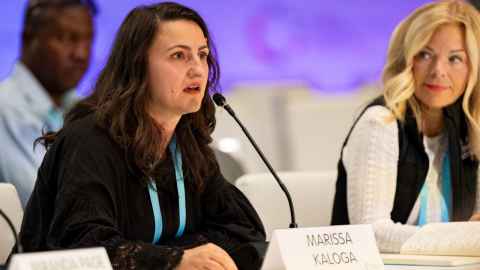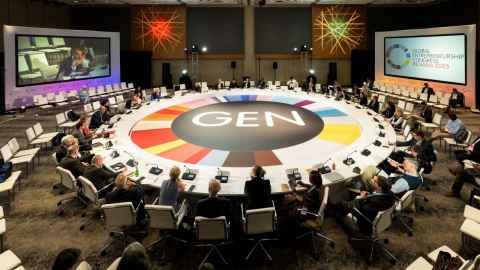Global Entrepreneurship Congress spotlights New Zealand’s unique voice
23 September 2025
Dr Marissa Kaloga shared New Zealand’s unique approach to entrepreneurship with the world at the Global Entrepreneurship Congress in June.

Dr Marissa Kaloga is a Hynds lecturer of entrepreneurship at Waipapa Taumata Rau, University of Auckland. As an entrepreneurship academic, Dr Marissa Kaloga has been actively involved with the New Zealand branch of the Global Entrepreneurship Network (GEN NZ) for several years and was recently elected as a trustee. This year she took her involvement global, heading to Indiana in June to join dozens of international delegations to participate in the Global Entrepreneurship Congress (GEC) and the GEN Research Summit, which focused on how research can support entrepreneurship practice in the real world.
The field of entrepreneurial research has expanded in “exciting ways” in the last few decades, Dr Kaloga observes.
“There’s a more diverse base of contributors actively broadening the set of constructs about what entrepreneurship is, and who is an entrepreneur, with a growing interest in equity, ecology, and social context.”
The GEN Research Summit provides an essential network for these researchers, offering a diverse programme of challenging sessions. One of these was the Compass Round Table. The session introduced and explored emerging initiatives which are evaluating entrepreneurship support programmes for efficacy and impact, such as GEN Catalyst.
“It’s an important area to investigate to ensure these services are providing the best advice and support for founders,” notes Dr Kaloga.
Unsurprisingly, the impact of AI on the field of entrepreneurship was a dominant theme of the GEC. As an entrepreneurship educator, Dr Kaloga was invited to share her insights as part of a panel. The discussion explored the regulatory environment for AI in entrepreneurship education.
“The GEC in general was strongly pro-AI in entrepreneurship. I think AI’s implementation will likely be a double-edged sword. We have an opportunity to use technology to create the world we want to leave to our children and grandchildren. To do this we need to think first about what kind of future we want to build, and secondly about if or how different technologies can help us achieve that.”

Of the many enlightening experiences on offer at the GEC, a workshop focused on the development of innovation cities proved a standout for Dr Kaloga.
“It resonated because Auckland is actively positioning itself as a global innovation city, and the session offered practical frameworks for how we might chart that path. I was particularly struck by the emphasis on ‘focused hubs’, where regions can leverage ambition and unique resources to claim leadership in emerging fields rather than competing in already saturated sectors. That framework felt directly applicable to New Zealand’s context, where aligning innovation with our distinctive strengths could both drive prosperity and address pressing global challenges.”
An important takeaway for Dr Kaloga was that New Zealand’s innovators have equally valuable insights to share with the global entrepreneurial community.
“Founders and governments around the world are actively searching for alternative models of entrepreneurship, and our founders are already pioneering sustainability and values-led approaches that could offer exactly that,” she notes.
We benefit as a country from a uniquely positioned knowledge base of Māori entrepreneurship, drawing from logics and values that offer a different vision of entrepreneurship from globally dominant models.
An invitation to feature on popular entrepreneurship podcast En Factor, recorded during the GEC conference, offered further evidence of the increasing interest in New Zealand’s trailblazing approach to innovation.
“My key takeaway from both the GEC and the GEN Research Summit is that there is space opening for more critical, creative, and values-led approaches. What inspired me most was the validation that New Zealand’s founders, pioneers in sustainability and kaupapa-driven models, are contributing to something the world is actively seeking: alternative paradigms of how entrepreneurship can be practised. It reinforced my conviction that our innovators need to shout their ideas more loudly to the world.”
Contact
Questions? Contact the Centre for Innovation and Entrepreneurship for more information.
E: cie@auckland.ac.nz